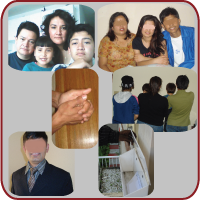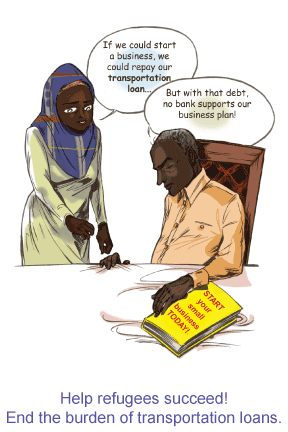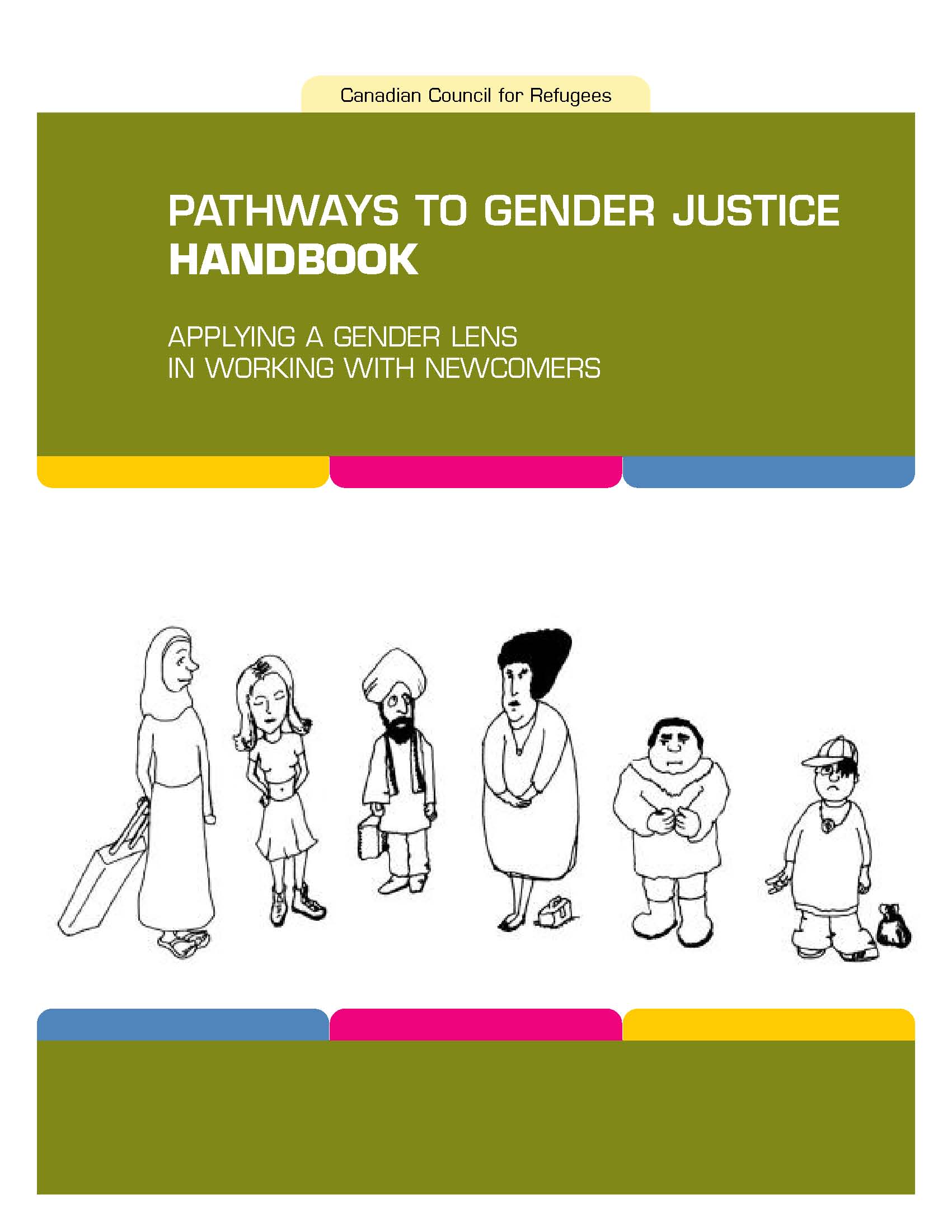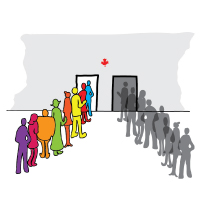***
CONTENTS:
- Refugees Need Protection without Discrimination
- Open Letter to Prime Minister: Upholding refugee protection in Canada
- BC Municipalities call on Canadian Government to Absorb Refugee Transportation Loans
- Benamar Benatta asks the Canadian Government for Answers
- Announcing - Building Welcoming Communities, CCR Fall Consultation 3-5 December, Windsor
- Come to the National Forum: Improving Services and Protection for Trafficked Persons, 2-3 December, Windsor
- Faces of the CCR: Marisa Rojas, Multicultural Association of Fredericton
- New from the CCR
- Pathways to Gender Justice Handbook: Applying a gender lens in working with newcomers
- From Permanent to Temporary Migration: Canada’s dramatic policy shift
-----
 In September, the Canadian Council for Refugees issued a statement deploring comments by the Minister of Citizenship and Immigration Jason Kenney suggesting that refugee claimants in Canada are “fake” and that “real refugees” are overseas.
In September, the Canadian Council for Refugees issued a statement deploring comments by the Minister of Citizenship and Immigration Jason Kenney suggesting that refugee claimants in Canada are “fake” and that “real refugees” are overseas.
Under the UN Convention relating to the Status of Refugees, Canada has legal obligations towards people in Canada who claim our protection. 2009 is the 40th anniversary of Canada’s signature of this fundamental instrument of refugee protection.
The Minister’s comments were quoted in an article in Embassy Magazine, “Resources better spent on UN-approved refugees: Kenney”, published September 9, 2009, suggesting that refugees who claim protection in Canada are less worthy of protection than those overseas.
The Minister’s preference for processing refugees overseas completely ignores the serious problems in Canada’s overseas refugee system. Processing of refugee applications takes years and there is a backlog of 30,000. In public discussion of refugee reform over the past few months, many have called the inland system “broken”, but have neglected the failings of the overseas system: a case apparently of “out of sight, out of mind”.
The CCR strongly condemns the labelling of claimants as “fake”. 42% of refugee claims in Canada are accepted. Of those that are not, some are refugees who were wrongly refused and would be recognized as refugees if the government implemented the right of appeal that exists in the law. Others do not meet the narrow refugee definition but have fled a situation of discrimination or generalized risk. CCR members report that the Minister’s rhetoric about “fake claimants” is not only creating a negative environment for refugees in Canada, but is leading to claimants being denied access to necessary services, based on prejudices about claimants being “bogus”.
The CCR believes that most Canadians are concerned for refugees in need of protection, whether they are here or overseas, and want Canada to live up to its legal and moral obligations towards refugees.
For the full press release from the CCR, see:
http://ccrweb.ca/en/bulletin/09/09/17
To read the article in Embassy Magazine with Minister Kenney’s comments, see: http://www.embassymag.ca/page/view/resources-9-9-2009
The CCR has prepared an open letter to the Prime Minister expressing grave concern that the recent deeds and actions of the Canadian government are betraying our fundamental legal and moral obligations towards refugees.
Since the beginning of the summer, the government has dramatically closed the door on many people seeking Canada’s protection, has announced plans for changes to Canada’s refugee determination system that would make it less fair, and has hurt refugees by the highly negative language used to discuss them publicly.
The letter calls on the Prime Minister to recommit Canada to the principles of refugee protection and to uphold our country’s best traditions of welcoming those who flee persecution.
The letter has already been signed by organizations representing a range of sectors, including Amnesty International, the Canadian Labour Congress, the International Civil Liberties Monitoring Group, the Refugee Lawyers’ Association of Ontario and Table de concertation des organismes au service des personnes réfugiées et immigrantes (TCRI).
The CCR encourages other organizations to take this opportunity to take a position on refugee protection by adding their name to the letter. To sign on, send an email to varka@ccrweb.ca with the name of the organization and the name and title of the person representing the organization.
On 19 October we will send the Prime Minister a list of signatories to that date, so if possible please sign on before then.
The full text of the letter is available at:
http://ccrweb.ca/documents/letterrefugeeprotection09.htm
 Great news! At the end of September, the Union of British Columbia Municipalities approved a resolution calling on the federal government to absorb the costs of refugee transportation loans.
Great news! At the end of September, the Union of British Columbia Municipalities approved a resolution calling on the federal government to absorb the costs of refugee transportation loans.
Have your municipal council follow this lead by adopting a resolution calling on the federal government to cancel transportation loans for all resettled refugees to Canada. The more voices that call on the government to change its policy, the greater the chances that the government will respond.
For more information on what to say to municipal officials, see: http://www.ccrweb.ca/transportationloans.htm#action (Take Action, Option 4)
For more information on the Union of BC Municipalities decision, see:
Vancouver Sun, Municipal politicians want feds to change refugee policies, October 1, 2009, http://tinyurl.com/ydx8pxh
In early September, a coalition of rights groups called on the Canadian government to disclose fully documents relating to the illegal transfer to the US on September 12, 2001 of Benamar Benatta, resulting in his detention there for close to five years.
Mr. Benatta brought a motion in Ontario Superior Court to demand full disclosure on September 11, almost exactly 8 years since his transfer to the US. In responding to Mr. Benatta’s suit for damages, the government failed initially to disclose a number of documents that are helpful to Mr. Benatta’s case. The existence of these documents is known because Mr. Benatta had earlier obtained them through Access to Information. On being challenged, the government responded that the documents were “not relevant”. This raises a question about whether there are other important documents that the government has similarly deemed “not relevant”.
Mr. Benatta has been seeking answers as to why he was handed over to the US without any legal process. The government has not responded to his questions. Because there is no complaints mechanism available to him, he has been forced to turn to the courts.
Mr. Benatta was treated as a suspect in the September 11 attacks and detained for nearly five years, despite being quickly cleared of any suspicions. He was held in conditions that the U.N. Working Group on Arbitrary Detention found could be described as torture and suffered abuse that is well-documented by the US Department of Justice. Canadian officials finally arranged for his return to Canada in July 2006. Mr. Benatta was granted refugee status in Canada in November 2007.
For more information, see:
The full press release, at http://ccrweb.ca/en/bulletin/09/09/09
Globe and Mail, “Algerian refugee handed over to U.S. accuses Ottawa of cover up”, 10 September 2009, Kirk Makin, http://tinyurl.com/ybt4sup
Letter to Minister of Public Safety, 11 December 2008, re. Government of Canada’s Statement of Defence, http://www.ccrweb.ca/documents/benatta08.htm
Open letter to Minister of Public Safety, 8 May 2007, calling for an investigation of the case, http://www.ccrweb.ca/documents/benatta.htm
 From 3 to 5 December 2009, refugee and immigrant rights advocates from across Canada will be gathering in Windsor for the Canadian Council for Refugees (CCR) Fall 2009 Consultation, on the theme Building Welcoming Communities.
From 3 to 5 December 2009, refugee and immigrant rights advocates from across Canada will be gathering in Windsor for the Canadian Council for Refugees (CCR) Fall 2009 Consultation, on the theme Building Welcoming Communities.
The Consultation is a key opportunity to explore together how to build communities across Canada that are welcoming to refugees and immigrants. Consultation participants include: refugees, immigrants, representatives of NGOs, youth advocates, government, UNHCR, academics and international guests.
Consultation discussions will address issues that challenge refugees, immigrants, advocates and community workers. In addition to larger plenary sessions, workshops and working sessions will produce strategies for further collaboration and specific actions.
Topics addressed at this consultation include:
- Providing services and protection to trafficked persons (in conjunction with the national forum on trafficked persons, see below)
- Exploring border issues affecting refugee claimants
- Examining the impacts of two-tier citizenship
- Improving access to post-secondary education for newcomer youth
- Using new media for effective networking and communication in local communities
- Working towards anti-oppression in working with newcomers
- Respecting the rights of migrant workers
...and many more
Information about the consultation and online registration forms are now available at: www.ccrweb.ca/eng/about/meetings.htm Register before 13 November to take advantage of the reduced fees!
- Come to the National Forum: Improving Services and Protection for Trafficked Persons, 2-3 December, Windsor
 Held in conjunction with the CCR Fall Consultation, this two-day forum will bring together organizations and representatives from across Canada to exchange information and strategies on protection and services to trafficked persons. Government and other interested stakeholders are also invited to participate in these meetings.
Held in conjunction with the CCR Fall Consultation, this two-day forum will bring together organizations and representatives from across Canada to exchange information and strategies on protection and services to trafficked persons. Government and other interested stakeholders are also invited to participate in these meetings.
For more information and to register, see: http://www.ccrweb.ca/traffickingforum.htm
 Since March of 2008, Marisa Rojas, Coordinator of the Program for Immigrant Women at the Multicultural Association of Fredericton (MCAF), has been involved in developing the Pathways to Gender Justice handbook, which is now available on the CCR website at: http://www.ccrweb.ca/documents/genderhandbook.htm. The handbook was created as a tool to support gender analysis of settlement policies, programs and activities.
Since March of 2008, Marisa Rojas, Coordinator of the Program for Immigrant Women at the Multicultural Association of Fredericton (MCAF), has been involved in developing the Pathways to Gender Justice handbook, which is now available on the CCR website at: http://www.ccrweb.ca/documents/genderhandbook.htm. The handbook was created as a tool to support gender analysis of settlement policies, programs and activities.
For Marisa, working on the Pathways to Gender Justice handbook went hand-in-hand with the goals of the MCAF’s Program for Immigrant Women. By providing support to volunteers and staff at local agencies which serve immigrant women, as well as facilitating participation of immigrant women in information sessions, educational opportunities, events and organizations, the Program for Immigrant Women aims to help immigrant women achieve full participation in the economic, social and cultural life of Fredericton.
The process of preparing the handbook and her role as facilitator of group discussions on gender analysis was also a process of self-discovery for Marisa. “In my particular case it allowed me to discover some deep triggers and biases that persist in me, for sure they are affecting the relationship with my clients. Without recognizing this, it would be impossible to help people to change the way that they see things in gender matters. Working on this project has allowed me to be more open to the way I see things than before.”
Already, the Pathways to Gender Justice handbook has created greater awareness of gender analysis at the organizational level of the MCAF. Approaches used with clients are being reconsidered, and gender issues are discussed with the MCAF staff. As Marisa explains, “We did not pay attention before; now we are more conscious.”
- Pathways to Gender Justice Handbook: Applying a gender lens in working with newcomers
 The CCR is proud to launch a new tool, the Pathways to Gender Justice Handbook, which was developed with the active involvement of CCR members across Canada.
The CCR is proud to launch a new tool, the Pathways to Gender Justice Handbook, which was developed with the active involvement of CCR members across Canada.
The Handbook is a practical guide that aims at enhancing the capacity of organizations to use a gender-based approach in their work with newcomers. It can be used in different areas of an organization, such as governance, management and direct services. It is a flexible tool that can be adapted to different sizes and types of organizations. We hope you will find it useful in your work with refugees and immigrants.
For more information and to download the Handbook, go to http://ccrweb.ca/documents/genderhandbook.htm
The CCR wishes to thank the members of the Advisory Committee, the organizations that participated in the pilot project and their service users who contributed their time, energy, experience and creativity to the success of this project.
- From Permanent to Temporary Migration: Canada’s dramatic policy shift
 The CCR is concerned about Canada’s recent shift to temporary migration, which marks a dramatic change in policy for which there has been little public debate. In 2008, the number of temporary foreign workers in Canada exceeded the total number of permanent residents admitted in the same year. For a country built on immigration, large-scale temporary migration has significant social, political and human implications. The CCR is launching a new pamphlet to raise awareness of organizations, the public and Members of Parliament to these concerns.
The CCR is concerned about Canada’s recent shift to temporary migration, which marks a dramatic change in policy for which there has been little public debate. In 2008, the number of temporary foreign workers in Canada exceeded the total number of permanent residents admitted in the same year. For a country built on immigration, large-scale temporary migration has significant social, political and human implications. The CCR is launching a new pamphlet to raise awareness of organizations, the public and Members of Parliament to these concerns.
For more information, to download the pamphlet and to order copies of the pamphlet from the CCR office, see: http://ccrweb.ca/temporaryworkers.htm
